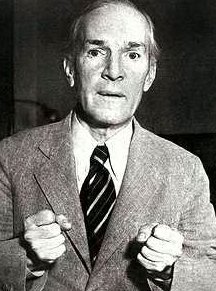
Upton Beall Sinclair Jr. was an American writer who wrote nearly 100 books and other works in several genres. Sinclair's work was well known and popular in the first half of the 20th century, and he won the Pulitzer Prize for Fiction in 1943.
A political party platform or program is a formal set of principal goals which are supported by a political party or individual candidate, in order to appeal to the general public, for the ultimate purpose of garnering the general public's support and votes about complicated topics or issues. "Plank" is the term often given to the components of the political platform – the opinions and viewpoints about individual topics, as held by a party, person, or organization. The word "plank" depicts a component of an overall political platform, as a metaphorical reference to a basic stage made out of boards or planks of wood. The metaphor can return to its literal origin when public speaking or debates are actually held upon a physical platform.
The End Poverty in California movement (EPIC) was a political campaign started in 1934 by socialist writer Upton Sinclair. The movement formed the basis for Sinclair’s campaign for Governor of California in 1934. The plan called for a massive public works program, sweeping tax reform, and guaranteed pensions. It gained major popular support, with thousands joining End Poverty Leagues across the state. EPIC never came to fruition due to Sinclair’s defeat in the 1934 election, but is seen as an influence on New Deal programs enacted by President Franklin D. Roosevelt.
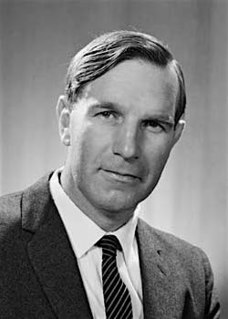
Ian McCahon Sinclair is a former Australian politician who served as leader of the National Party from 1984 to 1989. He was a government minister under six different prime ministers, and later Speaker of the House of Representatives from March to November 1998.
Charles William Blunt is a former Australian politician who served as leader of the National Party of Australia from 1989 to 1990.
William Edmund Newton Sinclair, known as W. E. N. Sinclair, was a Canadian barrister, solicitor and interim leader of the Ontario Liberal Party.
A candidate, or nominee, is the prospective recipient of an award or honor, or a person seeking or being considered for some kind of position; for example:

Culbert Levy Olson was an American lawyer and politician. A Democratic Party member, Olson was involved in Utah and California politics and was elected as the 29th governor of California from 1939 to 1943.
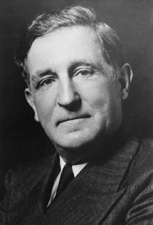
Sheridan Downey was a lawyer and a Democratic U.S. Senator from California from 1939 to 1950.

Friend William Richardson was an American newspaper publisher and politician. A member of the Progressive Party and later the Republican Party, Richardson was elected as the California State Treasurer from 1915 to 1923, and shortly afterwards as the 25th governor of California from 1923 to 1927. Richardson's governorship marked a sharp reversal in policies from previous administrations, rolling back many of the Progressive reforms and state governmental agencies put in place by previous governors Hiram Johnson and William Stephens.
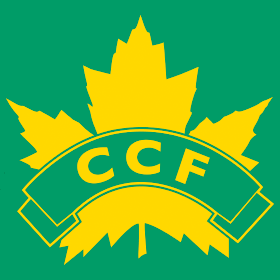
The Co-operative Commonwealth Federation – The Farmer-Labor Party of Ontario, or more commonly known as the Ontario CCF, was a democratic socialist provincial political party in Ontario that existed from 1932 to 1961. It was the provincial wing of the federal Co-operative Commonwealth Federation (CCF). The party had no leader in the beginning, and was governed by a provincial council and executive. The party's first Member of the Legislative Assembly (MLA) was elected by voters in the 1934 Ontario general election. In the 1937 general election, no CCF members were elected to the Ontario Legislature. In 1942, the party elected Toronto lawyer Ted Jolliffe as its first leader. He led the party to within a few seats of forming the government in the 1943 general election; instead, it formed the Official Opposition. In that election, the first two women were elected to the Ontario Legislature as CCFers: Agnes Macphail and Rae Luckock. The 1945 election was a setback, as the party lost most of its seats in the Legislature, including Jolliffe's seat. The party again became the Official Opposition after the 1948 general election, and defeated the Conservative premier George Drew in his seat, when Bill Temple unexpectedly won in the High Park constituency. The middle and late 1940s were the peak years for the Ontario CCF. After that time, its electoral performances were dismal, as it was reduced to a rump of two seats in the 1951 election, three seats in the 1955 election, and five seats in the 1959 election. Jolliffe stepped down as leader in 1953, and was replaced by Donald C. MacDonald.

The elections for the United States House of Representatives were held on 5 November 2002, in the middle of President George W. Bush's first term. Although it was a midterm election, the Republican Party gained a net eight seats, solidifying their majority. Some speculate that this may have been due to increased support for the President's party in the wake of the September 11 attacks.
Clem Whitaker and Leone Baxter were a husband-and-wife team that started Campaigns, Inc., the first political consulting firm in the United States. Based in California, the firm worked on a variety of political issues, mostly for Republican Party candidates. They both supported conservative ideals and are perhaps most famously known for preventing socialist Upton Sinclair from being elected Governor of California in the 1934 election. Together, they developed strategies and tactics - such as media advertisement buys and direct-mail campaigns - that are still widely used in today's campaigns. Their public relations work not only revolutionized politics in the modern era, but also deeply impacted political issues that remain relevant today.

Federal elections were held in Australia on 11 July 1987, following the granting of a double dissolution on 5 June by the Governor-General Sir Ninian Stephen. Consequently, all 148 seats in the House of Representatives as well as all 76 seats in the Senate were up for election. The incumbent Australian Labor Party, led by Prime Minister Bob Hawke, defeated the opposition Liberal Party of Australia, led by John Howard and the National Party of Australia led by Ian Sinclair.
Raymond LeRoy Haight was an American lawyer and politician from California. Involved in the Republican and Commonwealth-Progressive parties, Haight ran as a third party candidate during the 1934 California gubernatorial election.
The Combined English Universities by-election, 1937 was a parliamentary by-election for the British House of Commons dual member constituency of the Combined English Universities 22 March 1937.

In the Chicago mayoral election of 1955 Richard J. Daley was elected to his first term as mayor by a ten point margin.

In the Chicago mayoral election of 1911 Democrat Carter Harrison Jr. was elected to his fifth non-consecutive term as mayor, tying the then-record set by his father Carter Harrison Sr. for the most Chicago mayoral election victories. Harrison defeated Republican Charles E. Merriam and Socialist William E. Rodriguez.
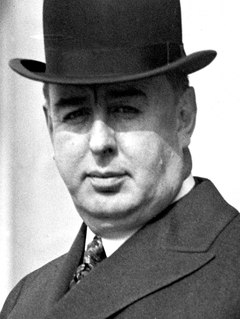
In the Chicago mayoral election of 1919 Republican William H. Thompson won reelection, winning a four way race against Democrat Robert Sweitzer, Independent candidate Maclay Hoyne, and Cook County Labor Party candidate John Fitzpatrick.
















